
Jill Robinson
Local writer and storyteller, George Murphy interviews local characters and personalities
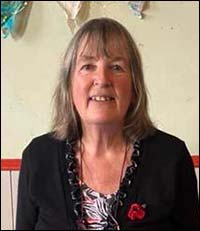 Introduction by Jill Robinson
Introduction by Jill Robinson
I came to live in the Calder Valley in 1985 as a single parent with two young boys. At the time, women bringing up children on their own were often regarded with suspicion. There was an attitude exemplified by comments of leading politicians along the lines of 'why couldn't she manage to hang onto a man...'
I secured a temporary job with the Community Programme at the Citizens Advice Bureau, having been a volunteer at Selby CAB at the time of the Miners' Strike when advice centres were inundated with requests for help. It was a serendipitous move, since I found the valley a very accepting place.
I had been judged and criticised all my life. My father - who thought that educating girls was a waste of time - had told me I would never go to university, although I have ended up with two degrees, while various partners said I would never write a book; or if I did it would never be published; or if it was, no-one would ever read it. (I have since published seven books which have gone around the world and been taken by libraries, bibliotherapy groups and reading groups.)
Having had my first piece published in The Observer and receiving a cheque for £75 (still a significant amount but even more so forty years ago) my mother-in-law, who had been in domestic service as a young woman, declared that 'writing is not for such as us' and presented me with a list of weekly household tasks which she found worked for her. As well as the usual Monday laundry, Tuesday baking etc. Thursday's job was 'washing the walls.' (Because of the soot in mining areas.)
Her son's attitude when he discovered I had been using the typewriter was to order me to put it away and get the vacuum cleaner out. I knew I had to escape if I was ever to be able to live the life I wanted, and I really did not want my own sons to grow up with such out-dated ideas of what constitutes a woman's role.
Upon leaving the CAB my friend and I set up an independent advice centre in Halifax, where there was a significant level of need. We received no public funds but as a registered charity we obtained grants from organisations such as the Getty Foundation and the Henry Moore charity. The centre ran for 11 years until the rent for the premises became too expensive; however, the need has not diminished.
The Calder Valley has been the saving of me. People here can live how they want, love whom they choose, wear what they like, do anything so long as it does not harm anyone else. The wonderful and much-missed Elaine Connell accepted Berringden Brow for publication with Pennine Pens. Then the former Northern editor of The Guardian, Martin Wainwright, who was intrigued by Hebden Bridge, asked me to write a monthly column describing various aspects of life in 'The Pennine Shangri-La' as he termed it; this ran for two years, until he retired. And it was never difficult to find something to write about!
Jill Robinson Q&A
You've sold thousands of books, often through self-published works. I've seen you standing next to stalls selling your novels. What advice would you give to other writers who are trying to get an audience for their works?
Since I don't have an agent, I find that it helps enormously to engage with the reading public. I give lots of talks to local organisations such as WIs, Probus groups and U3A, but of course all that stopped during the pandemic. I sell at Christmas Fairs, craft markets and events such as the recent Ripponden Jubilee street market. My next event is Wadsworth Walking Market on 12 June. People see a table of books and have no idea that the woman behind the table is the writer, but if I can catch their eye, engage them in conversation and explain a bit about the books, they often buy one, or even the complete Berringden Brow series; (my sons joke that people buy the books simply to get away from me...)
I know you often get fan mail - can you share some examples?
I am always touched when someone takes the trouble to write or email. I have kept all the cards, letters and messages readers have been kind enough to send. Some women have accused me of spying on their lives, having found themselves in similar situations; one even said she thought we had gone out with the same dreadful man. Readers of The Rainy Season comment on how life has changed since the 1960s and are interested to have been reminded of those times and the places mentioned. The message which pleased me the most was from a woman who had been living with depression for some years and who said that my books had given her back her love of reading – possibly the best thing anyone could say to a writer.
I'm interested in your back story. Can you tell us more about your upbringing and education?
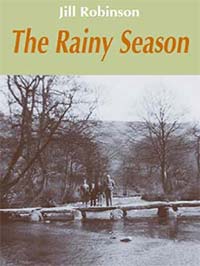 Well, I have written about this in The Rainy Season, my memoir of small-town life in the 1950s and 60s. Girls were then often regarded as second class; my father – or the man who I was told was my father, although there is a different name on my birth certificate – considered that I needed only to learn how to cook and do simple arithmetic for household accounts, while my best subjects were History, Geography and Latin, for which he had no time at all. He would turn me out of the house to study in nearby fields. (Luckily at that time I did not suffer from hay fever, as I now do, since the exams are always at the height of the grass pollen season.)
Well, I have written about this in The Rainy Season, my memoir of small-town life in the 1950s and 60s. Girls were then often regarded as second class; my father – or the man who I was told was my father, although there is a different name on my birth certificate – considered that I needed only to learn how to cook and do simple arithmetic for household accounts, while my best subjects were History, Geography and Latin, for which he had no time at all. He would turn me out of the house to study in nearby fields. (Luckily at that time I did not suffer from hay fever, as I now do, since the exams are always at the height of the grass pollen season.)
The town library shut at 7.30 so there was nowhere else to go. Some neighbours were kind and took me in if it was raining but they usually had the TV on so quiet study was impossible. My history teacher, who lived about a mile away, got to hear of my difficulties and allowed me to revise in peace in her attic. When I passed for university, father refused to complete the necessary grant application forms, and we had to appeal to County Hall for permission for my mother to complete them since married women were not allowed to do this at the time, only widows.
(Married women, even those with good incomes, required a male guarantor to enter into any sort of contract, even to rent a TV, let alone take on a mortgage.) Our appeal was successful, and I came to Leeds University, but sadly my mother died very suddenly while I was in my second year, so she never saw me graduate. I later studied for an MA at Bradford University, and have made my adult life here in Yorkshire.
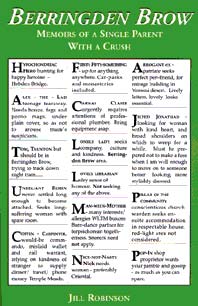 I'm enjoying Berringden Brow, your first book. It's subtitled, Memoirs of a single parent. Was single parenthood your motivation for writing that story?
I'm enjoying Berringden Brow, your first book. It's subtitled, Memoirs of a single parent. Was single parenthood your motivation for writing that story?
It was, partly; I had returned from a spell in Botswana, aged in my late forties, often a difficult time in women's lives, and was trying to work out what to do next. My younger son was then 13 and so I had the usual teenage escapades to contend with and I found that writing helped me to make sense of it all and to laugh at some of the situations which might not seem funny at the time but looking back are often hilarious. (eg Son running after-school club in my garden shed complete with bong.)
Has your own life inspired the plots of all your books?
My life, my friends' lives, village life, the dog's life, odd encounters on trains, things you overhear in bus queues, you name it, inspiration is everywhere! I feel sorry for those who nowadays go about with ear plugs, since they miss such a lot.
In your introduction, you describe your Citizens' Advice work. In partnership, you went on to set up an independent advice centre in Queens Road, Halifax, which ran for 11 years. What needs were you meeting in that area?
An enormous variety of problems: Welfare rights advice, immigration queries, debt counselling, housing difficulties, employment rights, personal problems such as referring young people, who did not wish to enter into forced marriage, to the relevant organisations – there was never a shortage of problems, and sadly I imagine the demand for advice can only have increased in the current difficult time.
Tell us about your journalism. You started out as a travel writer?
Well, my first piece was a travel item for The Observer, about a motorbike trip to the Loire Valley; I was fed up with reading about glamorous holidays in gites and on yachts so thought they could do with something a little more down to earth! I was never a dedicated travel writer (although I did contribute some pieces about my stay in Botswana,). My subsequent writing has been about a variety of topics, for the Guardian Women's page, the Society page, pieces on family life, the education press, even rather dry pieces on debt work for the Money pages.
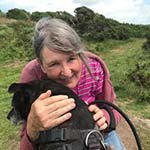 What are your special interests?
What are your special interests?
Walking the dog (a rescue Staffy) going for trips in my old campervan, and currently knitting, since I am a granny-in-waiting! (Baby girl due in October.)
I did quite a bit of voluntary work during the lock-down, delivering meals and food parcels.
You've told me that Lark Rise to Candleford is your favourite book. What was its special appeal for you?
The social history details of late nineteenth century/early twentieth century village life told against a family story (which inspired my writing The Rainy Season in the third person rather than the first, if it worked so well for Flora Thompson…). My father was born in 1899 so the world she described was the world he knew.
What's your favourite film? Il Postino
Do you have a favourite piece of music?
Anything by Kirsty McColl. Her lyrics are humorous, touching and perceptive.
What makes you laugh?
Lots of things! The small absurdities of everyday life...
What's the good and bad of living round here?
It's all good! See my intro – we can please ourselves, be ourselves. One bad thing I suppose is we are rather far from the sea.
Where's the best place you've been for a holiday?
Cuba, on a study tour with the Cuba Solidarity group in 2004. We visited schools, hospitals and a ballet school as well as doing the more touristy things such as sight-seeing and the beach.
Where would you like to visit?
New Zealand
What are your aims for the future?
I want to be the best granny any little girl could possibly have (!) and it would be good if my books were picked up by a mainstream publisher. After receiving several requests, I'm currently looking into getting them done as audio books.
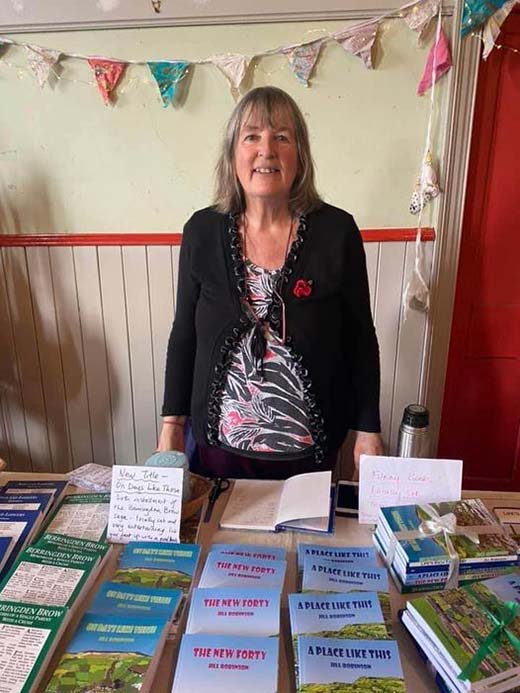
More HebWeb interviews from George Murphy
If you would like to send a message about this interview or suggest ideas for further interviews, please email George Murphy

